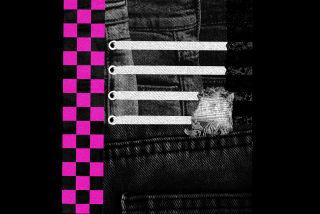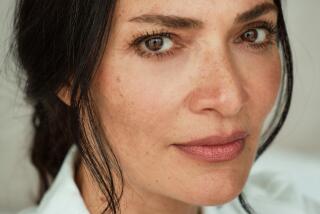Just the way you are
AS the 12-year-old nephew of Betty Suarez on “Ugly Betty,” Justin Suarez is not your average television series foil.
For starters, he’s Latino. He also knows exactly how a belt can accessorize a Valentino gown; he can sing and tap a la Gene Kelly in “On the Town,” and when a cheating boyfriend breaks his aunt’s heart, Justin’s antidote is to offer her chamomile tea.
Is there a subtext there?
Since the show premiered in September, Justin’s sexuality has been a hot topic in the entertainment industry and among the show’s fans, even though whether he is gay has never been directly addressed in the Golden Globe-winning comedy. ABC President of Primetime Entertainment Steve McPherson and “Ugly Betty’s” creator Silvio Horta make fair assertions that the child is too young to be sexualized, and so his orientation shouldn’t play a part in the show -- at least, not yet.
Additionally, the message over and over from the network, producers and cast members is that in 2007 a character’s sexuality shouldn’t matter. Although that point is also well-taken, wasn’t it only two weeks ago that actor Isaiah Washington tainted ABC’s Golden Globe celebration for “Grey’s Anatomy” with his homophobic slurs, proving that homosexuality can still be a big deal?
Whether the effeminate and fashion-obsessed Justin is gay, his presence on the No. 1 new comedy of the season is certainly breaking ground, and nobody is more aware of it than the 12-year-old who plays him.
“My fan mail is mostly kids, especially kids that don’t really fit in and people don’t really understand them,” Mark Indelicato said. “They go, ‘Thank you, because you’re helping me to be understood by my peers,’ and anybody else who doesn’t understand them. That touches me. I’m glad that I’m reaching such a large amount of people.”
Horta’s over-the-top remake of the popular telenovela, “Yo Soy Betty La Fea,” has won audiences over with a diverse cast that puts a Latino family front and center, and surrounds its central character, Betty, with people of all races and classes.
And in a recent episode, there was the addition of Rebecca Romijn, playing the former brother of Daniel Meade (Eric Mabius). Yes, brother: He died as Alex and came back from the grave as the transgender Alexis. “The show is about people who feel different,” Romijn said. “If you honor yourself and you’re real, then you’re going to be a happier person.”
Make no mistake: There’s no soapbox on the one-hour romp that is “Ugly Betty,” but the show weaves in a message.
In an episode in which Justin spent the day at Mode magazine, he met Marc (Michael Urie), a flamboyant assistant, who offered this advice when Justin reveals that kids at school don’t “get” his blue sweater vest: “Be who you are, wear what you want. Just learn how to run really fast.”
“What the show does is normalize what should be a normal thing,” said Michael Jensen, the editor of AfterElton.com, a gay media website. “Justin wouldn’t have had a big coming out moment at this moment in life, but it still seems very clear. And the same thing with Marc. I don’t remember him at any point saying, ‘Yes, I’m gay, I’ve got a boyfriend’ or something like that. It’s just completely woven into the fabric of the show in a completely natural way. And I think that’s how you get to people. You slip in the side door without making a big deal out of it.”
In fact, the success of the series largely lies in the writers’ use of common stereotypes to lead viewers down a road and then take unexpected turns. Characters -- even those who don’t work in fashion -- are portrayed larger than life, leaving room for their humanity to be uncovered when layers are peeled away.
“The characters on ‘Ugly Betty,’ stereotyped that they may be, are written about lovingly by somebody who is obviously not judging them. And that’s what’s important,” said Ross von Metzke, senior editor of here! Interactive Media, website for the gay and lesbian channel.
Jensen agreed: “I do know that some people have reacted to the exaggeration of the characters, but that’s the sensibility of the show. And I think that the only time that would be offensive is if everyone else was understated and then you have the gay character flounce on and be all dramatic and really stand out.”
Urie, 26, says he took a look at the script, which called for “Wilhelmina’s bitchy gay assistant” to inject Botox into his boss’ brow, and he wanted to be Marc.
“Even in the beginning stages, I was glad that it wasn’t a gay character that was all about going out and being some mean boy-crazy gay guy,” Urie said. “He didn’t just come in and say his colorful lines and talk about the cute boy and run. He’s actually about something. It’s just that in the world of fashion, that translates into, you know, gay guy.”
Of course, said Horta, the backdrop of his show is the fashion world in Manhattan, so it followed there would be gay characters at Mode. But in Queens, where Betty lives, the idea for a boy who lives for musical theater and fashion was born more out of a need to counter Betty in a humorous and touching way than out of the desire to make headlines with TV’s first mainstream gay child character.
“I wanted someone to come from Betty’s world and inform her journey and be a sort of a young sage,” Horta said. “The dynamic of that relationship is just so appealing to me. And he’s such a fun character we never see. He’s not old enough for us to explore his sexual identity. We will have to deal with it, absolutely, as the show evolves and his character evolves.”
That won’t please all of the viewers. Already, the Web has been busy with chatter from people charging that the show has become too gay-centric and that ABC and the producers are, according to a post on the ABC.com message boards, “teaching children to be gay.”
“That doesn’t make sense,” Urie said. “I watch ‘Grey’s Anatomy,’ I don’t become a doctor. I don’t die when I watch ‘CSI.’ I’m not actually lost when I watch ‘Lost.’ I can’t believe people would write that. They’re just afraid. I think that if people can see themselves in a character, then that means the character is worth keeping.”
Devout fan Sandy Edelstein, a Palm Springs mortgage broker, appreciates the sensitivity of the writers toward a young character who is still finding himself, but notes there have been some undeniable clues.
In the episode in which Justin visited Betty at Mode, after he spent much of the day helping out in the wardrobe department, Daniel said: “You can go home now, Betty. I’m sure your nephew is tired of being in the closet.”
“Everyone with half a brain knew what the undertone of that line was supposed to be,” Edelstein said. “It is an age where you just don’t know. He could be straight and that’s just the way that he is. But it’s sort of done with a wink and a nod and I do think that a lot of gay men can see themselves at that age when all the other kids were out playing ball and some of us were inside reading the fashion magazines, or reading a cookbook or watching Martha Stewart.”
The child who plays him says Justin’s sexuality is irrelevant because “his family will love him the same.” Indelicato is completing a research project for school on the history of fashion so that he can keep up with the witty boy who knows what “swag” is.
“I think that Justin can inspire a lot of different people and that’s why I wanted to play a part that’s very inspirational because it’s a big leap for me,” Indelicato said. “He’s a great character and he just touches people’s hearts and that’s why I love playing him.”
More to Read
The complete guide to home viewing
Get Screen Gab for everything about the TV shows and streaming movies everyone’s talking about.
You may occasionally receive promotional content from the Los Angeles Times.






